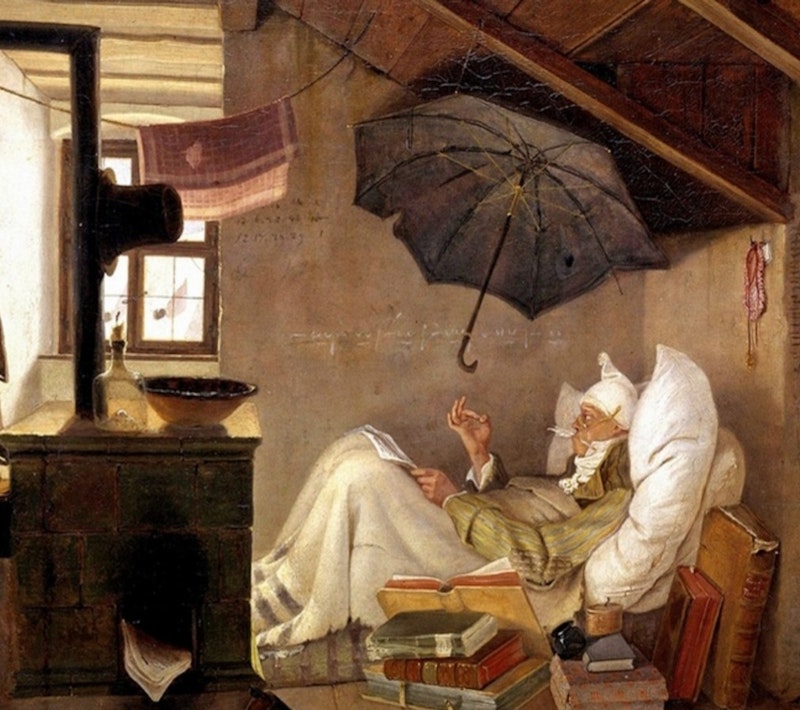There was never any solid ground, much less a platform, in society for poets. It was always a matter of whether they starved on the streets or lucky enough to have a leaky roof over their heads. It’s more a way of living than an occupation. The need for poets is nil. A nonexistent lifestyle for those who practice the art form of poetry instead of pursuing money, fame, or literary recognition. In rare cases, for example, the idle rich of the 19th century tolerated poets during the Romantic period. Poets were never needed or appreciated.
The likes of Lord Byron, Keats, and Shelly, among others, had a place in the early-1800s after Shakespeare and Christopher Marlowe before them had made their names and reputations. Other than these guys, it was hard for anyone who considered the poetic life. It wasn’t the first choice for anyone who wished to pursue a passion for wordplay.
The painting (above) titled “The Poor Poet” by the German painter Carl Spitzweg in 1839 is a prime example. It’s a sad but whimsical vision of the poet in his ramshackle garret using an old, tattered umbrella to protect him from the roof dripping rain. He’s alone in bed, working on a manuscript that may eventually wind up being burned with last week’s newspapers in the fireplace stove for a little heat. Near the stove, there appear to be more pages of paper stacked on the floor. A quill-feather pen in the artist’s mouth hangs like a cigarette. His left hand holds a sheath of poetry, and his right hand in the air could signify his counting off the meter of his rhyme, or more likely he’s squashing a bed bug between his fingers. Next to his mattress, there are piles of books scattered about.
The painter was popular among the public, and his work, “The Poor Poet,” became famous with Germans, who in a poll voted it their second most loved work. The first being da Vinci’s “Mona Lisa.” Hitler loved the painting, collecting many of the artist’s renditions. Still, poets remain among the poorest of the poor. It’s an old story with a tragic tradition, with women, children, and the elderly the victims of the most poverty-stricken. How poets fit the bill is beyond my feeble imagination. As a poet, I’ve suffered through many injustices in my lifetime, but the pursuit of truth and happiness has always outweighed the chase for monetary gain.
Not to mention, I’m no fan of the various schools of poets that dictate their own prejudices and beliefs on behalf of other poets who don’t follow their dictums. Poetry has always been a solitary endeavor, and there’s no need for preaching about what they believe poetry is or should be. Like all art, it’s subjective. There are no hard rules. Just because you like it doesn’t mean it’s accepted by everyone. Poetry’s a journey with no geographical destination. It’s a trip inward to the heart and soul of the poet. Often biographical and philosophical. Part discovery and examination of the world that surrounds not only the poet, but also the people in the culture they dwell in and ultimately must survive despite it.
Henry Miller said the poet is conditioned to ecstasy,” like a gorgeous unknown bird mired in the ashes of thought. If they succeed in freeing themselves, it’s to make a sacrificial flight to the sun. The dreams of a regenerated world are but the reverberations of their own fevered pulse beats. They imagine the world will follow them, but in the blue, they find they are alone.” This might explain why poets are poor. They think what they offer has value. Not necessarily financial worth, but intrinsic in that it offers alternatives of viewing the world we must inhabit. The world’s a crazy place, filled with chaos and disillusionment. If you expect an easy escape from the madness, you may find comfort in poetry.
To define the nature of poetry, look inside yourself first. You can go in any direction from there. You act as the focal point. It’s not for everyone. I’d never recommend becoming a poet. Neither to read it or write it. Like all art, it’s an acquired practice. There are better occupations to pursue. Maybe a short-order cook. If you’re qualified, go for it.

